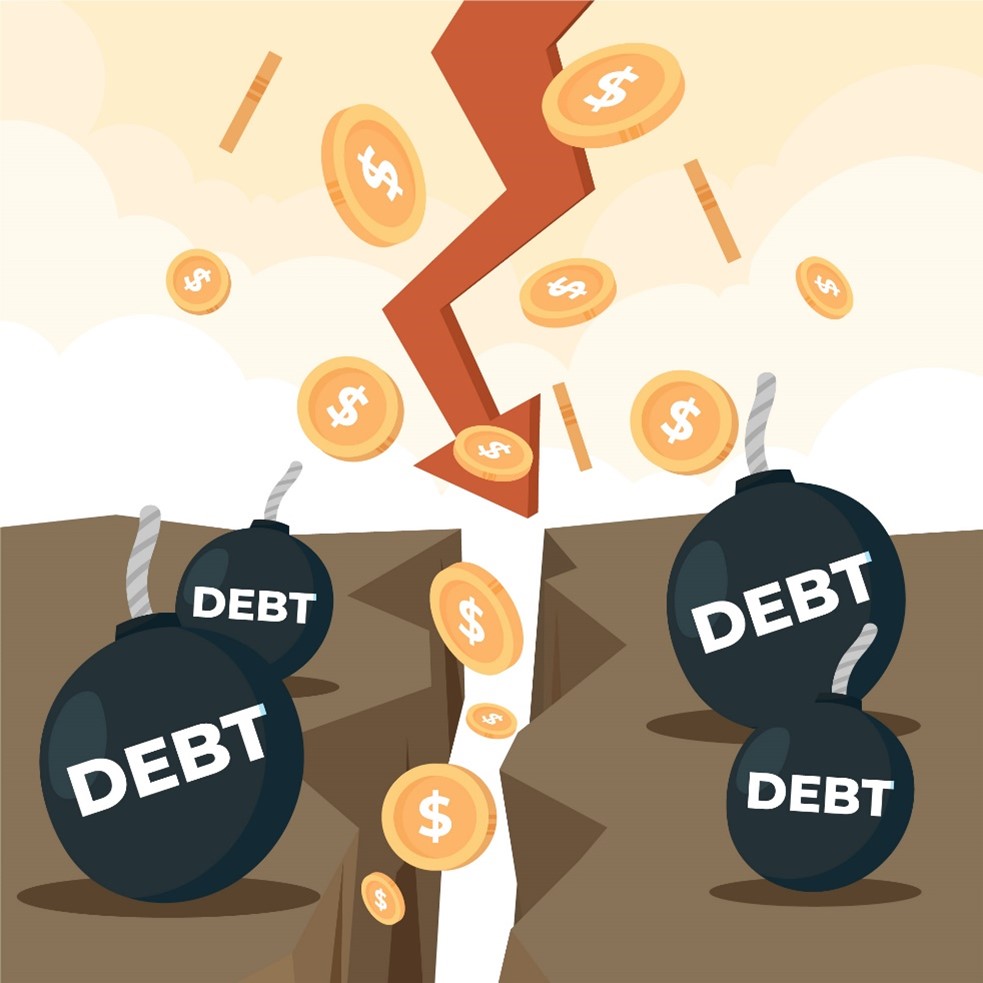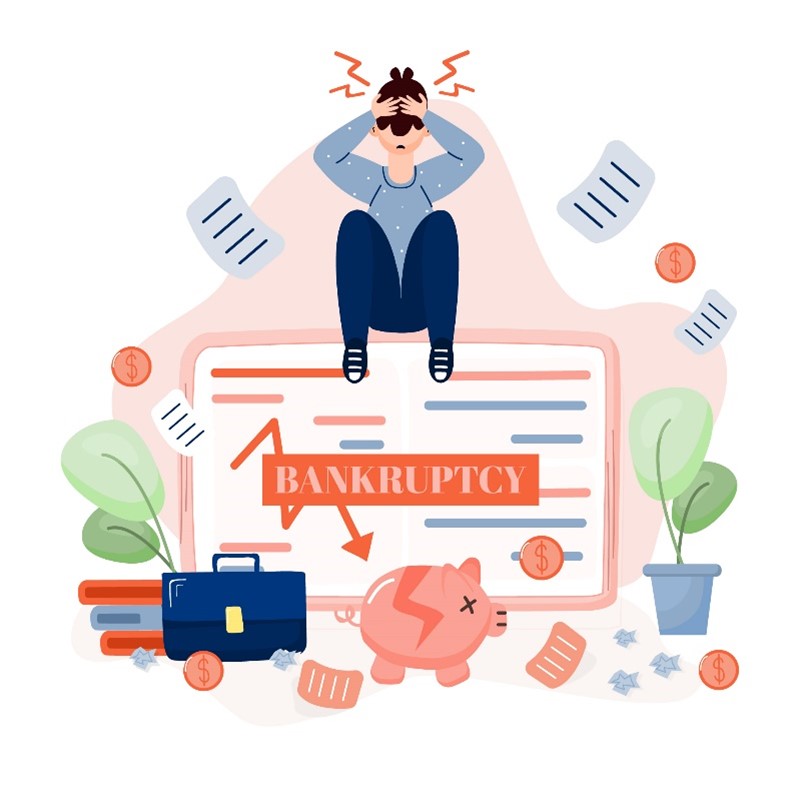
In the ever-growing world of b2b collections, compared to consumer debt recovery, the commercial sector has received the most attention since it tends to have its complications. With businesses expanding and rising inflation, keeping track of commercial collections can take time. Therefore, many companies are gravitating towards online AR management platforms that provide ease of access and maximum debt recovery, such as CollectCo, which offers expertise to the b2b collections with first and third-party collections.

One of the top priorities for all company personnel when managing a business in today’s competitive market is to sustain business cash flow in debt recovery for b2b collections and to keep it on the positive end of the spectrum. With global debt hitting a record of $307 trillion in 2023 alone, dealing with outstanding invoices can severely affect the business cash flow.
Accounts receivable can result in various issues, from restrained cash flow to commercial collections. Businesses may need help keeping up with their operational costs, capital management, and investment funds, which can increase the probability of default risk and declaring bankruptcy. Therefore, businesses must conduct risk assessments to sustain a business cash flow recovery system for debt recovery in b2b collections.
One of the critical aspects of managing a business is to keep an eye on the business cash flow while managing debt for b2b collections. The relative business cash flow depends on the organization’s financial decisions to keep its businesses secure for a specific amount of time. In terms of commercial collections, companies can experience an influx and an outflux of monetary resources, also known as positive and negative business cash flows. A cash flow assessment of a company can show us insights regarding the cash lent between businesses and is vital in the debt recovery process.
As the name suggests, positive business cash flow occurs when the rate of earnings made by the company exceeds the rate of expenses in b2b collections. In simpler words, more money comes in, and less money goes out. Positive business cash flow is also applicable to debt recovery in b2b collections; it means the business either has a higher recovery rate of accounts receivable or can manage its debts on a timely basis in the commercial collection. This is an ideal situation for the company as they will likely face fewer failed debts, and their debt collection seems right on track in B2B collections.
On the contrary, when a business faces more expenditures such as utility expenses, maintenance costs, salary wages, etc., without making the necessary sales to maintain such expenses, the company faces negative business cash flow. In the case of debt recovery for b2b collections, when the users cannot pay the credit given to them by the business in exchange for their services, this, in turn, also leads to negative business cash flow within the company.
It is no secret that keeping up with debt recovery and commercial collections can positively impact an organization’s finances. That being said, the opposite can be challenging to manage without a prior synopsis of the monetary losses the business could incur if not careful. Unstable b2b collections can lead to business cash flow disruptions and bad debts that ultimately have to be written off by the companies if the debt recovery is not made.

Therefore, initiating commercial collections without strategies can cause a decline in the business’s client base, which will lead to more monetary problems alongside debt recovery.
While competent commercial debt collection agencies such as Cedar Financial prioritize cordial communications with user-centric approaches that enhance the customer experience while maintaining an optimal debt recovery rate, businesses should monitor their B2B collections and recovery strategies to ensure a positive customer experience.
Several elements must be considered simultaneously for a business to maintain a positive business cash flow. The burden of debt recovery for b2b collections can also cause mismanagement of resources if not done correctly.
For such purposes, debt collection agencies specializing in commercial collections, such as Cedar Financial, can help with first—and third-party collections. The reasons why the recovery rates for such collection agencies are higher compared to the in-house efforts done by the businesses can range from flexible payment options to commercial credit validation, resolving disputes, debt settlement, undertaking negotiations, and much more. Here are some benefits companies can avail themselves of by collaborating with a debt collection agency to optimize their debt recovery for b2b collections better.
While some customers may not find regular follow-ups enchanting, one of the perks of debt collection agencies is allowing businesses to keep in touch with the debtors. This develops a mutual bond of respect and reliability between both entities for debt recovery in B2B collections.
Personalized follow-ups can be tricky to execute without the assistance of debt collection agencies. Without proper acknowledgment of protocols and regulations, a line of professionalism can be crossed very easily, ultimately putting a bad name on the company itself and negatively impacting your debt recovery for B2B collections.
The core functionality of debt recovery for B2B collections can significantly impact customer perception of the company. Businesses are widely aware that a substantial portion of their sales depend on their image in the user market.
Debt collection agencies such as Cedar Financial prioritize managing and elevating the company’s image in b2b collections to ensure that it is creditworthy and reliable. This can help make debtors more open to timely payments and settlement negotiations in debt recovery for commercial collections.
Nobody likes getting calls from debt collectors asking why their debts haven’t been cleared in b2b collections. Maintaining a sense of empathy while focusing on debt recovery can be a tedious task in commercial collections.
While professional debt collection agencies train their agents to connect with their customers emotionally to understand their queries while following the professional protocols and regulations for debt recovery in b2b collections, businesses must ensure that they also follow the same operations on a communicational basis across multiple omnichannel. This, in turn, will help ensure they increase their debt recovery in b2b collections.
One advantage of commercial collections is that, if done right, it can be easier than consumer-based recovery. Especially when collaborating with a debt collection agency, businesses can provide their debtors and customers with easy debt resolutions for b2b collections that enhance the user experience and optimize the debt recovery process.
Though such negotiations may need an element of empathy, efficient debt resolutions can minimize the risk of bad debts while improving the business cash flow and speedier debt recovery rates. This helps maintain customer retention and enhance brand integrity to instill confidence in the user experience for debt recovery in B2B collections.
Although commercial debt collections can severely impact a business’s financial models at a varying rate, several factors can contribute to the development of bad debt within B2B sectors, especially when the US is leading the commercial debt charts at a staggering 24.68%.
Whether the entities in question willingly let their accounts receivable proceed without paying their unpaid invoices or are facing genuine uncertainties, all such reasonings in b2b collections can lead to devastating financial constraints if not dealt with promptly. Therefore, it is essential to keep a clear eye out for early signs of bad debt since they occur over a certain period, during which companies can assess the situation and set up the necessary protocols for debt recovery.
Declaring Bankruptcy in Commercial Collections
Compared to the consumer sector, b2b collections usually account for a larger portion of finances during operations. Debt recovery in commercial collections can put a strain on the debtors, which can lead to their declaring bankruptcy.

While this may seem like an easy way out, declaring bankruptcy has its own set of challenges that can, in turn, lead to more problems for the debtor business, under such strenuous conditions and financial restraints, debt recovery for b2b collections cannot be persuaded as in normal circumstances, so pending debt converts into bad debt.
Unstable economic conditions are a common yet prevailing reason for bad debt in B2B collections. Simply put, a business won’t be able to repay its obligations if it lacks the necessary funds.
In the presence of uncertain financial conditions, many external and internal factors could be at play, and that could, in turn, lead to bad debt. The debt recovery of b2b collections can contribute to increased risk of defaulting, business cash flow constraints, business failure, and reduced debt recovery rates when it comes to debt collection in general. To combat such uncertain situations, businesses may start with early intervention programs, flexible payment plans, and fiscal policies to stabilize their monetary conditions for optimized debt recovery in commercial collections.
Although commercial credit is given to businesses that require it, an improper screening process can result in debtors failing to meet their obligations, resulting in monetary damages and bad debt.
While at face value, it can be hard to predict whether the obligated client will be able to pay unpaid invoices, organizations can undertake specific screening and vetting techniques to ensure that their debt recovery for b2b collections goes successfully.
A creditworthiness assessment is implemented to better analyze the debtors’ creditworthiness. This involves gathering insights from the company’s previous transactional history and reviewing credit reports, financial statements, and credit scores. Analyzing these factors gives us a general prediction of how the debt recovery for B2B collections will turn out.
In certain instances, B2B collections can quickly become a mess of misunderstandings and missed invoices due to vague communications regarding the payment terms between the parties involved. To avoid such cases, which can lead to bad debt, representatives of both organizations must present transparent payment terms on the table, ensuring that neither entity can claim unlawful debt recovery for b2b collections.
As previously discussed, while creditworthiness assessments focus primarily on the financial aspects of the business that could contribute to bad debt, a thorough background check includes a broader analysis of the company that could add more value regarding its reliability and trustworthiness to better manage debt recovery in b2b collections.
A typical background check could include analyzing public records, ownership structure, litigation history, market reputation, and assets and liability checks. When commercial collections are done with a complete background check, it can bring about positive business cash flows and streamlined operations for debt recovery in b2b collections.
A standard business transaction in debt recovery includes delivering products or services in exchange for the credit given to the receiving party. Yet, if the receiving side refutes the deliverables, this could hinder the debt recovery process, as both parties would be at a stalemate. Such cases could jeopardize the business’s financial stability if the transactions are not cleared up, as the debt involved has a higher probability of getting converted into bad debt in B2B collections.
While businesses worldwide are trying to keep up with their debt recovery in b2b collections, Cedar Financial, the leading debt collection agency, prioritizes its customers through its expertise in global coverage of commercial collections. Our 30 years of accounts receivable management (ARM) experience enable us to provide businesses with significant growth curves in their monthly and annual debt recovery rates. Since debt recovery for commercial collections is crucial for the stability of companies across multiple industries, contact Cedar Financial today to start collecting your claims.

